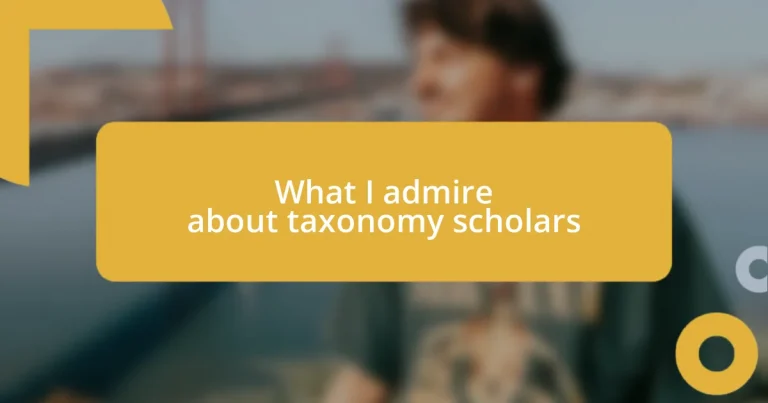Key takeaways:
- Taxonomy scholars passionately classify and name organisms, revealing the intricate relationships and unique characteristics essential for understanding biodiversity.
- Their work intersects with conservation efforts, providing crucial information that informs policies and protects endangered species, thereby enriching ecological knowledge.
- Collaboration among taxonomists, facilitated by technology, enhances scientific discovery and fosters community involvement in environmental protection initiatives.

Understanding taxonomy scholars’ work
Taxonomy scholars engage in the intricate process of classifying and naming organisms, often diving deep into the evolutionary relationships between species. I remember attending a seminar where a renowned taxonomist passionately described the thrill of discovering a new species. Hearing their excitement made me realize just how much this work resonates on a personal level, transforming the mundane into thrilling discoveries.
Understanding taxonomy involves more than simply cataloging organisms; it requires an in-depth study of their characteristics, habitats, and behaviors. Isn’t it fascinating how a single genetic variation can define a new species? During my studies, I encountered a taxonomy paper that unraveled the uniqueness of a butterfly species based on its mating patterns. The precision and attention to detail required in their work reflect not only intellectual rigor but also a deep-seated passion for the natural world.
Moreover, taxonomy scholars often work at the intersection of science and conservation, using their classifications to inform ecological efforts. When I hear of a taxonomist who identified a rare plant and then advocated for its preservation, I feel a profound respect for their dual role as scientist and steward of the environment. Such stories remind me that their work goes beyond academia; it’s about protecting our planet’s biodiversity and ensuring that future generations inherit a richer, more diverse world.
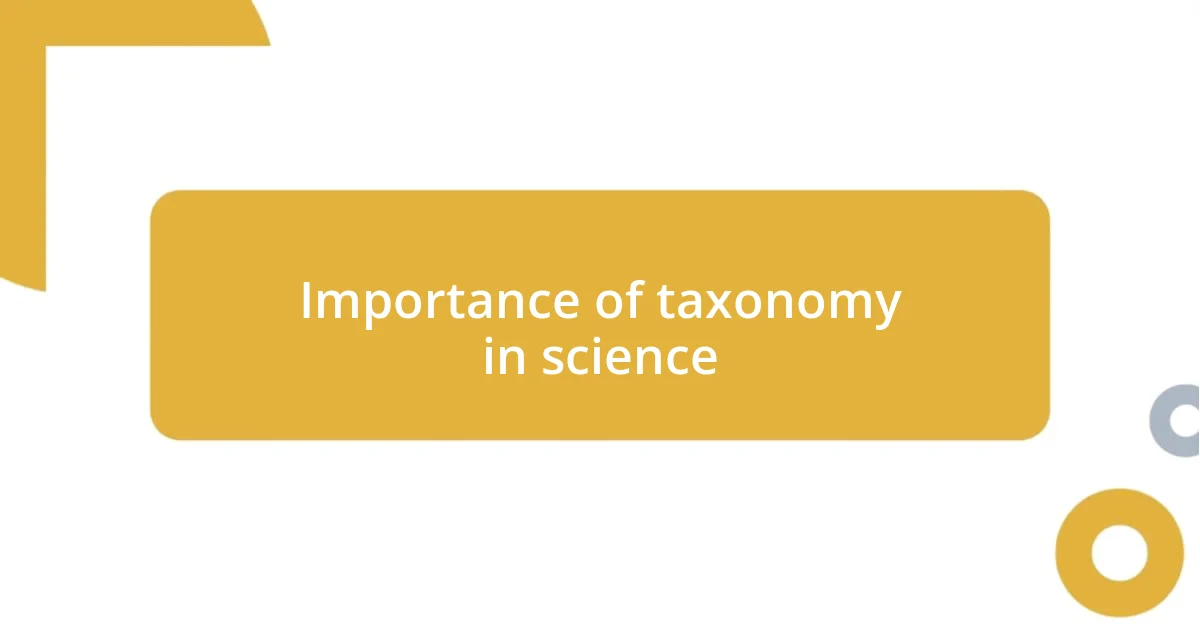
Importance of taxonomy in science
Taxonomy is foundational to understanding biological diversity and the relationships between organisms. I vividly recall a field trip I took where we explored a rainforest. As we encountered various plants and animals, our instructor shared insights on their taxonomic relationships. It struck me just how vital taxonomy is in unraveling the complex web of life; it’s like a detailed map that guides researchers in their studies and conservation efforts.
Additionally, taxonomy plays a crucial role in fields such as medicine and agriculture. When I learned about how identifying plant species led to the discovery of new medicinal compounds, it felt like a lightbulb moment. By classifying and understanding the relationships among organisms, taxonomists can uncover a treasure trove of information that can enhance our health and food security. It’s truly inspiring how their work can have far-reaching impacts on various sectors.
Yet, perhaps one of the most compelling aspects of taxonomy is how it fosters a sense of wonder and curiosity about life. I often find myself enthralled by the stories behind species classifications. I remember reading about a taxonomist who dedicated years to studying a particular frog species, only to discover it was critically endangered. That commitment not only showcased the importance of taxonomy but also deeply resonated with me, emphasizing how this scientific discipline shapes our understanding and appreciation of biodiversity.
| Aspect | Importance |
|---|---|
| Diversity Understanding | Taxonomy provides a structured framework to categorize and understand the complexity of life forms. |
| Applications in Medicine | Classifying organisms leads to advances in discovering new medicines and improving agricultural practices. |
| Conservation Efforts | Taxonomy aids in identifying species at risk, fostering conservation initiatives to protect biodiversity. |
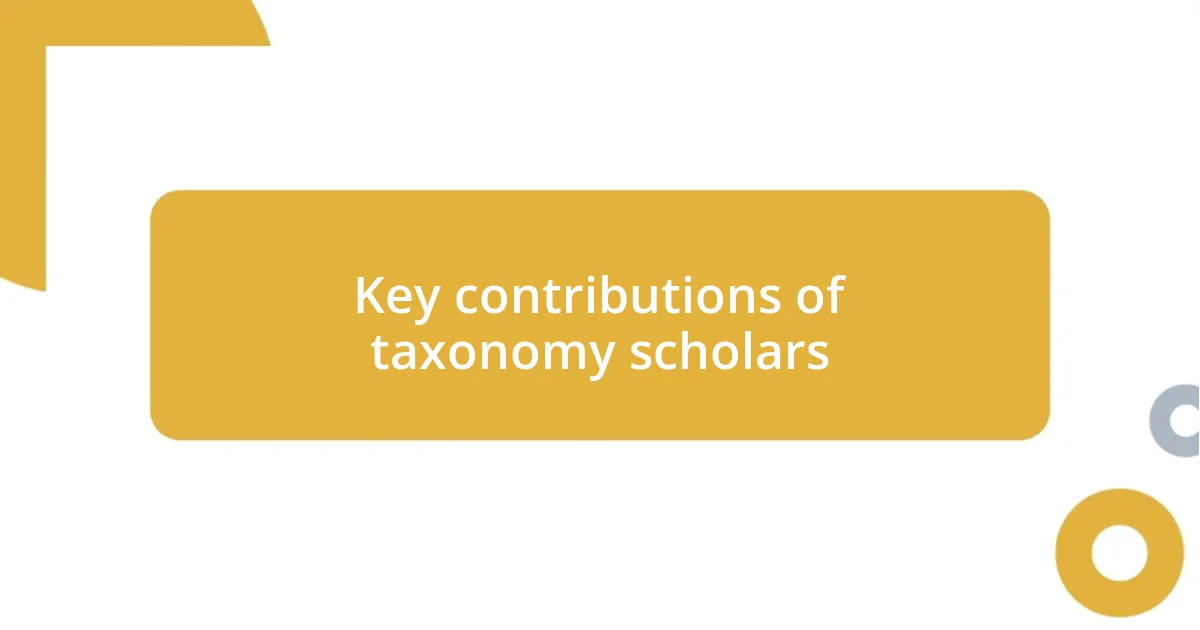
Key contributions of taxonomy scholars
Taxonomy scholars make significant contributions that extend beyond the confines of academia; they unravel the intricate stories of life itself. I think back to a documentary I watched about a taxonomist working in Madagascar. Her joy upon discovering a new lemur species was palpable. In that moment, I felt a wave of inspiration; it reminded me that each classification tells a tale, connecting us to the marvels of nature.
Here are some key contributions I’ve observed:
- Establishing Classification Systems: They create a structured way to identify and categorize living organisms, which helps in communicating biological information effectively.
- Advancing Scientific Knowledge: Taxonomy often leads to breakthroughs in understanding evolutionary processes, making connections that can shape entire fields of study.
- Contributing to Environmental Policy: Their findings can inform governmental and conservation policies, enhancing efforts to protect endangered species and habitats.
It’s also revealing to consider how taxonomy intersects with everyday life. I remember experimenting in my garden, trying to identify various plant species. I was amazed at how a simple label could elevate my understanding of those plants. Recognizing their taxonomy opened my eyes to their role in the ecosystem. This connection fuels my respect for those who dedicate their lives to studying and classifying these organisms. They are not just cataloging life; they are helping us comprehend the intricate tapestry of our world.
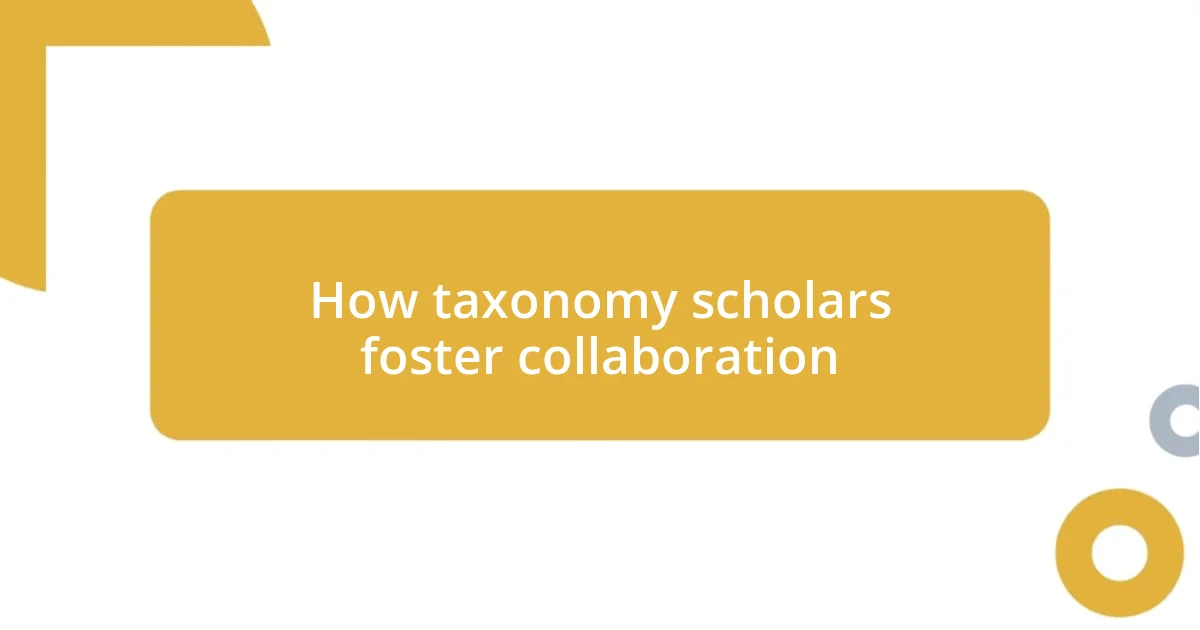
How taxonomy scholars foster collaboration
Taxonomy scholars have a remarkable way of bringing people together, often forming collaborative networks that enhance their work. I remember attending a conference where various taxonomists shared their findings and methodologies. It was inspiring to witness how they engaged in lively discussions about common challenges and solutions, creating a sense of camaraderie that transcended geographical boundaries. Isn’t it fascinating how sharing expertise can lead to greater discoveries?
Moreover, the use of technology in the field has simplified collaboration for taxonomy scholars. Tools like DNA barcoding and online databases allow them to work with colleagues from around the world, sharing data and findings in real-time. I once experienced this firsthand when I joined an online group focused on butterfly taxonomy. The exchange of information and resources with fellow enthusiasts was electrifying, illustrating how technology can break down barriers and foster collective knowledge.
Additionally, taxonomy scholars often partner with conservation organizations to address urgent issues like habitat loss. I recall a project where a group of taxonomists collaborated with local communities to identify endangered species in need of protection. The community’s involvement and the scholars’ expertise created a powerful synergy, highlighting how collaboration can not only enhance scientific understanding but also inspire emotional investment in local ecosystems. It truly reinforced my belief in the profound impact of working together toward a common goal.
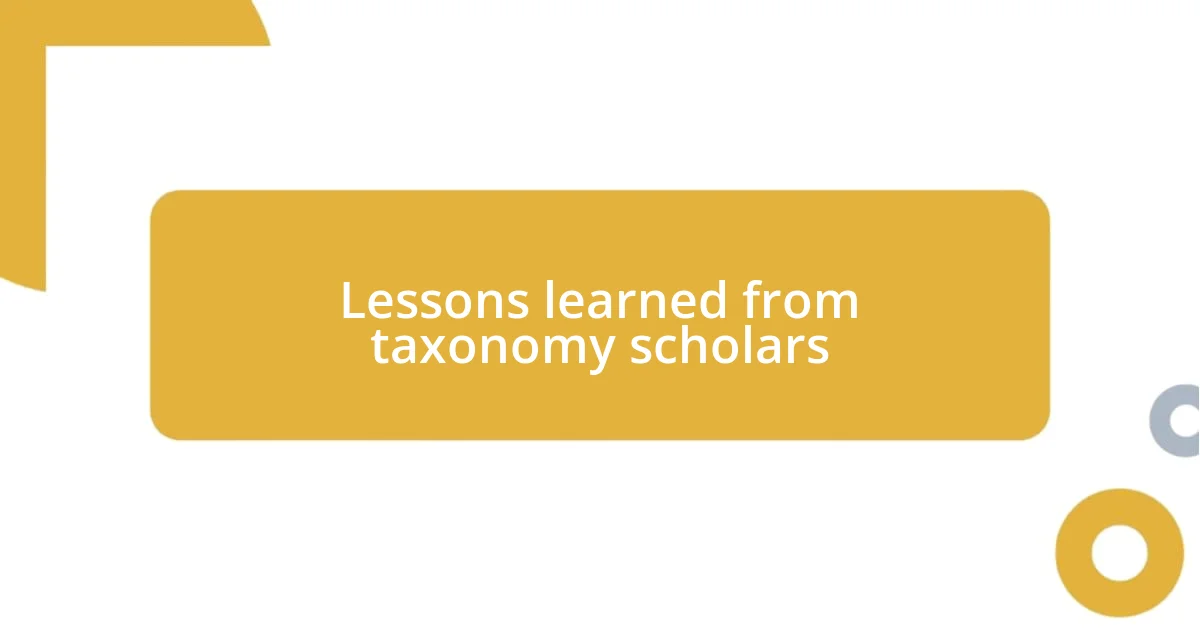
Lessons learned from taxonomy scholars
Lessons learned from taxonomy scholars often revolve around their commitment to detail and passion for understanding life’s diversity. I remember my fascination when I learned about the painstaking processes they undertake, sometimes spending years on just one species. This dedication teaches us the value of patience and thoroughness in all aspects of research. How often do we rush through our tasks, overlooking the beauty in meticulous work?
Another significant lesson I gleaned is the importance of adaptability in the face of new information. Taxonomy is not static; it evolves with new discoveries. A friend of mine, who is a novice botanist, once tried identifying a local flower based on outdated guides. Sadly, she got it wrong! This experience highlighted how taxonomy scholars continually reassess their knowledge, showing that being open to change is essential for growth. It’s a reminder that in our own lives, we should embrace new insights with humility.
Lastly, I’ve learned how taxonomy scholars serve as stewards of biodiversity. Their work often reveals the interconnectedness of all life forms. I once stumbled upon a community project where taxonomists engaged local students, teaching them about native species. The enthusiasm in those kids’ faces as they discovered their local ecosystem was unforgettable. It made me realize that fostering a connection to nature can empower future generations. Don’t you think nurturing that curiosity could lead to a more environmentally-conscious society?












